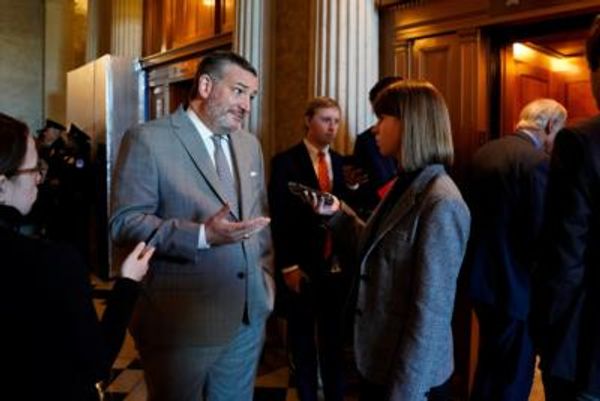
It may sound as if its title has come from the Alan Partridge school of TV commissioning, but there is nothing at all humorous about Rebekah Vardy: Jehovah’s Witnesses and Me. Vardy gets her notoriety out of the way in the early moments of this powerful film, explaining that she is best known as the wife of a Premier League footballer and “a bit of a controversial character from that trial”.
What follows is a harrowing account of her early life as a Jehovah’s Witness and an investigation of the Christian denomination, its structures and its practices.
Vardy has spoken before about being raised as a Jehovah’s Witness and her dislike of the organisation. Four years ago, she told the Loose Women panel that it was “horrible” and that, as a child, she felt alienated from other children, who would “poke fingers” at her for her beliefs.
Here, she goes much further, describing a series of traumatic events, while meeting others who describe their experiences within what is portrayed as a “high control” religion. (As you would expect from a film so accusatory, there is a lot of back and forth, as the Jehovah’s Witnesses UK branch committee is given the right to reply to each allegation. In one response, they call the idea that the religion is controlling “misleading and discriminatory”.)
Vardy points out that, in the UK, home to approximately 130,000 adult Jehovah’s Witnesses – there are roughly 8.5 million members worldwide – very little is known about the organisation and how it operates. She suggests that the perception from outsiders is of “harmless Christians that knock on your door, wanting to talk about God”.
She offers her own view of what it was like growing up in Norwich, attending Kingdom Hall meetings and Bible studies twice a week, or standing on the street doing “service rounds”. She talks of the end of days and the books she read when she was very young, which showed her detailed pictures of what Armageddon would look like. She felt judged by the outside world and accepted only by other Jehovah’s Witnesses.
From the age of 11, her life fell into disarray. Her parents divorced and she left Norwich, leading to former family members and friends “shunning” the family (divorce is allowed only under very limited circumstances). At 12, Vardy was sexually abused. By 15, she was “acting out” and was told to leave the family home. She has had very little contact with her family, many of whom are still Jehovah’s Witnesses, since.
The Jehovah’s Witnesses deny that “shunning” takes place, but there are several accounts here from people who have left the church and say that even their closest family members no longer talk to them. One man admits that he shunned his own children and was instructed to hang up the phone if they called him.
Vardy acknowledges that she feels a sense of guilt, even now, in going against the group and its teachings. But she is not alone. She expands her remit beyond the personal, speaking to others with stories to share. She meets a woman who had an affair while married, who alleges that the husband is treated as the head of the family and has absolute control over what happens within it.
After explaining the system of “elders” – senior male members of the church who provide “spiritual guidance” – Vardy meets two former elders who now consider themselves to be “free”. These men describe how the system works and why they believe it meets the parameters of “high control”. She also meets a woman who was a Jehovah’s Witness for 50 years and courageously waives her right to anonymity to discuss being sexually abused as a child, as well as the horrific denials and labyrinthine procedures she faced when she tried to report it.
As a presenter, Vardy is empathic and inquisitive. Clearly, she knows this world; when she meets others who have been through similar experiences, she has meaningful conversations perhaps because she has been there, too. When she tries to talk to the Jehovah’s Witnesses UK branch on camera, no one will come forward.
That is not surprising, but this documentary certainly is. You may come to it cynically, thinking it an attempt at career rehabilitation after “that trial”, but I doubt you will get to the end and still think that way.
• Rebekah Vardy: Jehovah’s Witnesses and Me is available on Channel 4







